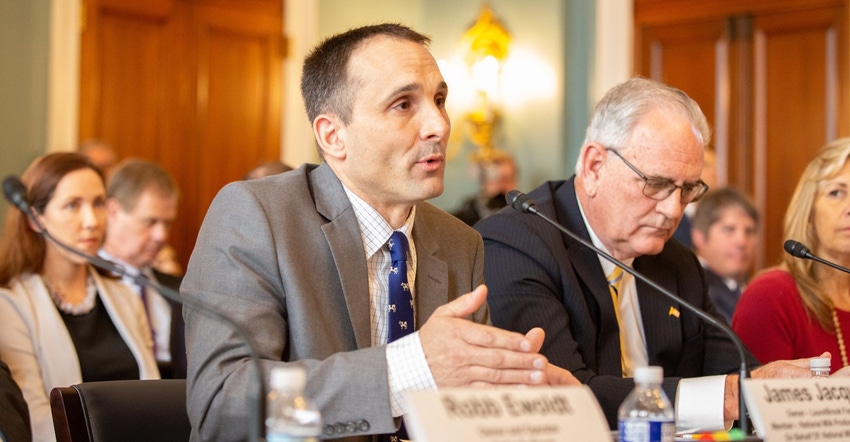Connecticut dairy farmer testifies on importance of pushing against EU’s protectionism of common food names.

When it comes to market access for dairy products worldwide, if future trade agreements lower tariffs but continue to allow the pervasive problem of geographical indicators, the U.S. dairy industry will continue to flounder.
“If one non-tariff barrier takes away market access, we have nothing,” Connecticut dairy farmer James “Cricket” Jacquier said before the House agriculture subcommittee on livestock and foreign agriculture on March 10.
During the hearing, Jacquier, chairman of the board for Agri-Mark, a dairy cooperative comprised of 850 farm families across New England and New York, frequently noted the detrimental effects of the European Union’s efforts to misuse geographical indicators to confiscate common food names, such as parmesan, feta and asiago, as well as wine and meat terms.
He said the U.S. Department of Agriculture and the U.S. Trade Representative must be “laser focused” to combat the EU’s efforts and continue to ensure that the U.S.-Mexico-Canada Agreement (USMCA) sets a strong precedent in safeguarding the use of common food names.
“The U.S. government must make it a policy objective to further expand upon this successful framework in other trade negotiations to ensure that safeguards for American-made common food name products are strengthened, cloaked barriers to trade are rejected and legitimate IP protections preserved,” Jacquier said in his opening comments.
He noted that trade is an important component of dairy producers’ profitability. Supply and demand are paramount, so trade needs to establish consistent markets for producers to rely on at all times. “If supply and demand move by 2-3%, the dairy farm price is impacted by 30%,” he explained.
“America’s dairy farmers applaud the certainty that lowered tariffs and fairly negotiated trade agreements bring to our industry. However, if we cannot combat outrageous non-tariff barriers, such as those the EU is manufacturing to block the export of American-made cheeses, these trade wins can ring hollow,” Jacquier said. "The EU’s stance on common food names is a protectionist and anti-trade policy and it must be firmly rejected by Congress and by U.S. trade officials at every turn."
Jacquier urged members of Congress to keep the focus on the importance of rectifying the actions around geographical indicators. “It is just as equal as any tariff out there,” he said.
“Congress needs to keep pushing on USTR and USDA to keep driving this home,” Jacquier testified. “We have to be successful on this, or the dairy industry will be lost.”
In his testimony, he said according to USDA data, the U.S. has loss more than 6,000 dairy farms over the last two years, or eight per day. In 2019, America’s dairy industry exported more than $6 billion in dairy products, ranging from cheese to ice cream to milk powders. Trade disputes and a lack of market access to competitors has significantly harmed the dairy industry, contributing to a 15% decline in dairy farms, he said.
About the Author(s)
You May Also Like




.png?width=300&auto=webp&quality=80&disable=upscale)
